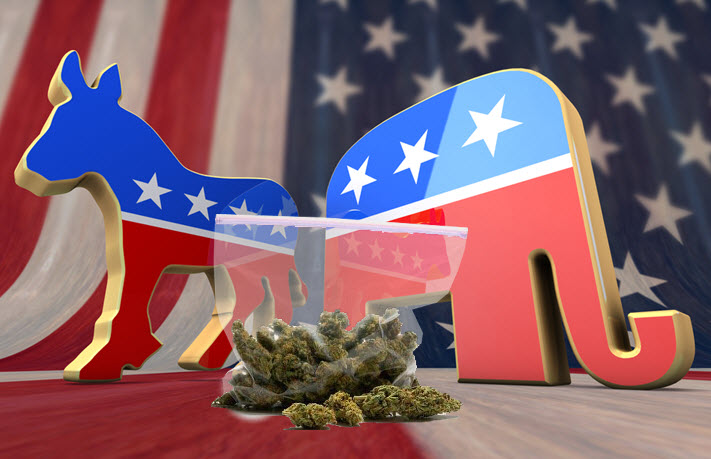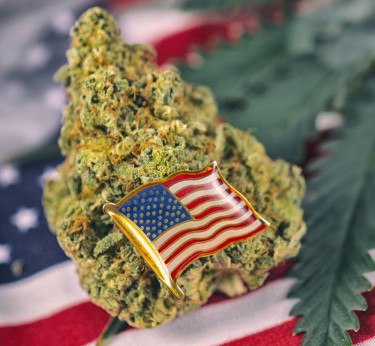
Is the Republican Bill Legalizing Marijuana On Arrival Dead If Mitch McConnell Doesn’t Endorse It?
Last week I wrote about the Biden government wasting its cannabis ace, reflected in cannabis stocks and the apparent loss of confidence in the Democratic Party on legalization issues.
It appears Republicans were paying attention too, and as a result, a Republican-sponsored pro-cannabis bill has increased the value of cannabis stocks since the document went public.
It’s no secret, however, that the Democrats have been pushing major cannabis reform for quite some time – they did not have a Republican vote for a number of reasons. Some of these reasons are because the bills are too far-reaching and large (according to Republicans), which makes some of the Republican base a little uncomfortable. Will the bill be dead in the water if a freshman Republican senator introduces it and without Mitch McConnell’s support? We shall see, but be careful when taking financial steps if you think this law is sure to be passed.
Especially since Republicans think they want a small government (at least in theory). The bill, sponsored by MP Nancy Mace (R-SC), is called the States Reform Act, which balances state rights and business interests and includes some of the social reforms that the Democratic bills seek to correct.
The reason this bill is important is because it is sponsored by the Republicans – which means that the very factor that the Democrats have been battling for the past few years can potentially come to a resolution.
Let’s take a look at what the bill currently looks like. It’s important to note that this is still floating around and receiving feedback before it’s officially released later this month.
The Basics of the Republican Sponsored Bill
Here’s what the Republican bill aims to achieve;
-
Cannabis is to be removed from the Narcotics Act and would be treated in a similar way to alcohol.
-
3.75% excise tax would be levied on cannabis sales to provide support for grant programs that would focus on community re-entry, law enforcement, and small business management assistance for newly admitted businesses.
-
The Treasury Department, which currently regulates alcohol and tobacco, would also be the main regulatory agency for cannabis, particularly with regard to international trade.
-
The FDA would be limited in its authority, except when it comes to medical cannabis. They could essentially propose serving sizes, certify government medical cannabis products, but not ban any of the product derivatives, be it for medicine, recreational, nutritional supplements, food, beverages, etc.
-
Raw cannabis would be considered an agricultural good and would be regulated by the Department of Agriculture
-
All current cannabis license holders would be incorporated into the federal system to ensure that patients would not be disturbed.
-
While federal agencies are constructing the framework for legalization, these companies, as well as consumers, would be protected until everything is in place.
-
People with non-violent cannabis convictions would have the right to have their criminal records deleted.
-
The age limit for cannabis use would be raised to 21 to discourage teenagers from using it, which would also affect cannabis advertising.
-
SBA would treat cannabis in the same way as other industries.
-
Veterans cannot be discriminated against for cannabis use and veterans hospitals are allowed to prescribe cannabis.
-
Federal agencies could continue to run drug tests for cannabis
-
The Bureau of Labor Statistics should issue a report on the cannabis industry.
While this is only the tip of the iceberg, we see a very sensible approach to legalization that would appeal to both Democrats and Republicans. All of these points can of course change and since the first preliminary issues are being discussed under different sponsors, we could see that a completely different draft law comes up.
Nevertheless, let’s analyze what we know so far …
A law that appeals to both sides
The bipartisan appeal has been the main issue with legalizing cannabis, and while the MORE Act has some strengths – the social justice aspect of the bills usually keeps Republicans from getting on board.
As you can see, there is minimal “social justice” when it comes to Republican law. It seems to care much more about states, small and medium-sized businesses, and the end user. In the democratic bills we see that much of it is devoted to “removing the negative effects of the drug war” in order to reverse the injustices that have negatively affected a large part of the population.
From an ethical standpoint, this is probably the best – but it poses a problem as it is a sense of positive action. When you say, “x% of the licenses must go to people of color”, you are creating a system in which the best candidate may not be eligible because of his or her skin color.
Conversely, if Republicans tried to legalize cannabis in a similar way to alcohol, it would mean that cannabis licensing arrangements could be severely restricted. It would no longer require those “heavy” requirements and high price tags that we currently see in licensing and regulatory compliance.
Personally, I think that reducing licensing and providing “grants” to the disenfranchised would actually have a greater effect than forcibly inducing the industry to favor a group of people just because of the facility’s past crime.
It is much better to get their criminal records removed and create a grant system that allows entrepreneurs to stand up in their communities.
Additionally, the 3.9% excise duty seems very reasonable, and most businesses would find that it would only add marginally to operating costs – most of which would be outsourced to the consumer one way or another.
While this bill is still in its infancy, if it gains momentum and the cannabis industry smiles at the sound of it, we may be able to see a Republican bill cross the finish line.
If that is the case, then the Democrats would have screwed up legalization, especially since they held a majority in Congress and the Senate. Doubling the Covid mandates and ignoring the cannabis reform could even cost her the presidency in 2024.
Hopefully we won’t see Trump vs. Biden in 2024 – if that’s the case, then the US hasn’t learned its lesson and will have to repeat another four years of disenfranchisement. One thing is for sure, the delay in legalization did not help the DP cause.
THE PATH TO LEGALIZATION, READ MORE …

IS THERE ANY WAY TO LEGALIZATION IN 2021? READ HERE!

Post a comment: